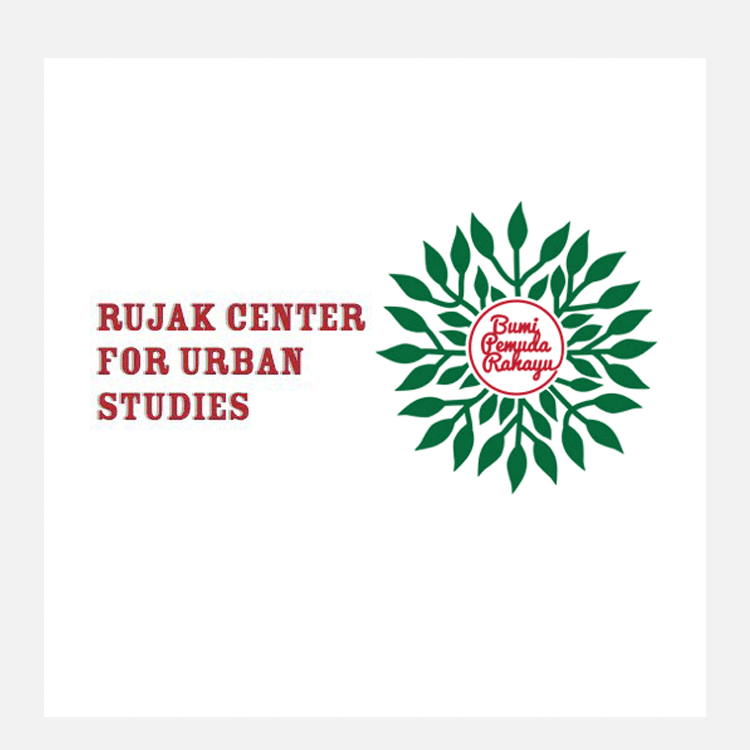
About RCUS
Rujak Center for Urban Studies (RCUS) is founded to fill the gaps in the necessary process of transition into the ecological age. The vision of RCUS is working together with communities in generating innovative knowledge and practices to build sustainable cities and regions.
By sustainability RCUS means not only surviving climate change and other ecological disasters, but also solving other urban problems that have predated our awareness about ecological issues. Nevertheless, we do believe that the awareness about ecology, and new production of knowledge that it sparked, have created a new perspective and opportunities for conceptualising our actions differently to solve those other outstanding urban problems such as poverty, justice, pluralism, inclusivity, etc. Indeed, they make possible a new way of building cities. However, it is also realised that much more new research and knowledge are needed to change many things.
RCUS wishes to focus on cities as human territories that amalgamate most, if not all, of contemporary and future human problems. In 2007 the world has passed the irreversible 50% urbanisation rate, due mostly to the highest rates in cities of developing countries. RCUS is looking out to the whole South East Asia and Timor Leste as it area of works, while starting firmly in Indonesia.
RCUS was built from different experiences and backgrounds of its co-‐founders who have been doing a multitude of research, capacity building and policy advocacy sporadically in the past two decades or so. They have some professional working experiences in the fields of good governance, arts and culture, heritage, development strategy, and post-‐disaster reconstruction (in Aceh).
As we learned by doing, however, we realised that changes require designed steps, bigger magnitude and collaboration, long-‐term commitments, perseverance, and hence serious organising. We wish to combine research, capacity building and policy advocacy under one roof of RCUS to make our efforts more effective.
Our persistent orientation is towards ever expanding ownership of sustained changes by citizens, through their initiatives and active participation in city-‐ and region-‐building. Our optimism is based on many years of encountering and working, at grass root levels, with growing number of citizens’s independent and autonomous initiatives, whose growth in the last decade is a very significant phenomenon in itself. In all our works we wish to always build infrastructures, spaces, and habits for citizens’ initiatives and participation, not as by-‐ products, but as the very goal itself. We wish to become a management center for knowledge that is to be generated together with communities to create innovations and to be used by communities in making changes. RCUS’s birthday is May 1, 2010. We look forward to collaborating creatively with as many partners as possible.
Bumi Pemuda Rahayu (BPR)
Bumi Pemuda Rahayu (BPR) BPR is a sustainability-‐learning center built and managed together by Rujak Center for Urban Studies, ARKOM Yogya (Community Architects, Yogyakarta) and KUNCI Cultural Studies Center. It is located in the village of Muntuk, Dlingo sub-‐district, Bantul district, Yogyakarta special region. Its environment is semi-‐rural at 450 m above sea level.
BPR is intended to bring together young people from diverse backgrounds to co-‐produce knowledge and creative practices in the fields of arts, architecture, urbanism, science and others that support changer towards ecological sustainability.
BPR supports activities such as residency for artists/writers/researchers, lectures, workshops on sustainable construction and urbanism, permacultures, etc.
BPR aims to support a vision of ecological sustainability through works with communities and arts on practical and theoretical levels. Architecturally the site itself is built on a model of self-‐sustainability, using various methods to approach minimum carbon footprint. All the materials used have been chosen for its lowest impact on energy, using recycled materials with the main building itself made from bamboo. All its waste will be recycled or composted, with specially designed human waste recycling plant to generate electrical power. The garden has been planned to be completely edible.
Requirements
TBC
Intern Duties
- Students accepted will be involved in the BPR project in Bantul, Yogyakarta
Work Hours
TBC
Location
Jalan Timor No. 10 Gedung Ranuza Lantai 2, Daerah Khusus Ibukota Jakarta 10350, Indonesia
